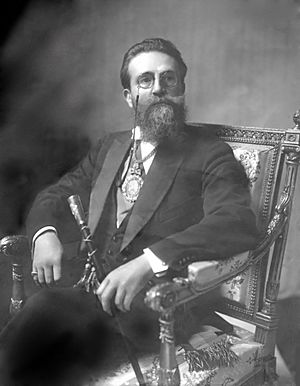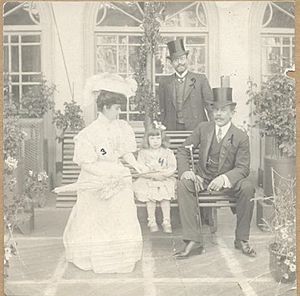José Gutiérrez Guerra facts for kids
Quick facts for kids
José Gutiérrez Guerra
|
|
|---|---|
 |
|
| 28th President of Bolivia | |
| In office 15 August 1917 – 12 July 1920 |
|
| Vice President | Ismael Vázquez José Santos Quinteros |
| Preceded by | Ismael Montes |
| Succeeded by | Bautista Saavedra |
| Minister of Finance | |
| In office 4 December 1915 – 18 January 1916 |
|
| President | Ismael Montes |
| Preceded by | Julio Zamora |
| Succeeded by | Néstor Cueto Vidaurre |
| Personal details | |
| Born |
José Manuel Gutiérrez Guerra
5 September 1869 Sucre, Bolivia |
| Died | 3 February 1929 (aged 59) Antofagasta, Chile |
| Political party | Liberal |
| Spouse | Agar Reyes Calvo |
| Parents | Lisímaco Gutiérrez Andrea Guerra |
| Relatives | Pedro José Domingo de Guerra (grandfather) |
| Education | Merton College |
| Signature |  |
José Manuel Gutiérrez Guerra was a Bolivian leader who became the 28th President of Bolivia. He was born on September 5, 1869, in Sucre, Bolivia, and passed away on February 3, 1929, in Antofagasta, Chile. People sometimes called him "the last Oligarch."
His grandfather, Pedro José Domingo de Guerra, was also an important leader. He served as acting president in 1879. He was known for being very honest and was the chief judge of the Supreme Court.
Contents
Early Life and Education
José Gutiérrez Guerra came from important families in Chuquisaca. His family history even connected to ancient Incan leaders and early Spanish explorers in Peru. He was also related to some famous people from Ireland and Britain.
When he was young, he went to England for school. He studied at Stonyhurst College, then St Bede's College, Manchester, and later at Merton College, Oxford. He finished his studies in 1890 when he was 21 years old.
After his education, he returned to Bolivia and worked in banking. He was an expert in economics. He didn't plan to become a politician, but he ended up entering politics. In 1914, he was chosen to represent La Paz in the Bolivian Congress. He quickly became very important and was chosen to run for president in 1917.
Presidency and Challenges
José Gutiérrez Guerra won the election and became president. But his time as president was difficult. Bolivia was facing tough economic times. Also, a new political group, the Republican party, was growing stronger and opposing him.
In 1917, the founder of the Republican party, José Manuel Pando, was killed. This event was never fully explained and made Gutiérrez's government less popular. People also felt that Gutiérrez didn't act strongly enough. He tried to investigate problems from the previous president's time, but it wasn't enough for his opponents.
The Liberal party had been in power for over 20 years. This was the longest time one party had ruled Bolivia. Many Bolivians were tired of the ruling group and their ways. Because of this, and his appearance, Gutiérrez was nicknamed "the last Oligarch." This meant he was seen as part of the old, powerful ruling class.
All these problems led to a coup d'état in 1920. A coup is when a group, often with military help, takes control of the government by force. The opposition Republican party, led by Bautista Saavedra, took power.
After the coup, Gutiérrez Guerra sought safety in the United States embassy in La Paz. He then moved to New York City and worked at Chase Bank. He lived the rest of his life outside Bolivia and passed away in Antofagasta, Chile, in 1929.
Important Projects During His Government
During José Gutiérrez Guerra's time as president, several important projects and changes happened:
- Oil drilling began in the areas of Chuquisaca, Santa Cruz, and Tarija. An American company, Richmond Levering Co., was given the rights to these oil fields.
- The drinking water system in the Beni region was started. Contracts were also signed to build sewage systems for the cities of La Paz and Cochabamba.
- New schools were built, including the Escuela Nacional de Bolívar de Oruro and Florida de Santa Cruz de la Sierra.
- The Military Aviation School was founded in el Alto de La Paz in 1920.
- The Mineralogical Museum of Oruro was opened.
- During World War I, Bolivia officially declared war on the German Empire.
One of his less popular actions was fining Simón Iturri Patiño, a very rich tin businessman. Patiño had been caught smuggling alcohol from Peru without paying taxes, which hurt the country's economy. Because of this, Patiño was removed from the Liberal party. This scandal made Gutiérrez even less popular and contributed to him losing the presidency. He was the first president to fine such a powerful business leader. This made him lose support from many wealthy people in the country. His removal from power in 1920 was quite easy because he had lost almost all his allies.
See also
 In Spanish: José Gutiérrez Guerra para niños
In Spanish: José Gutiérrez Guerra para niños
 | Chris Smalls |
 | Fred Hampton |
 | Ralph Abernathy |


